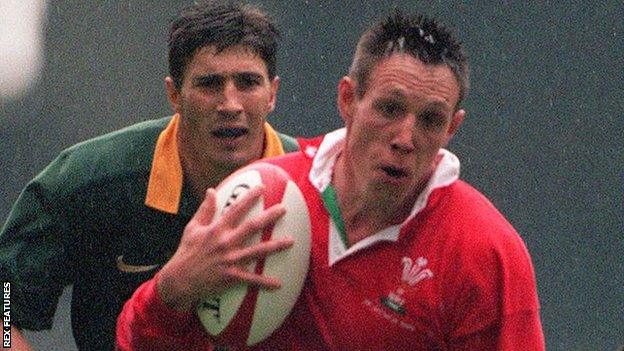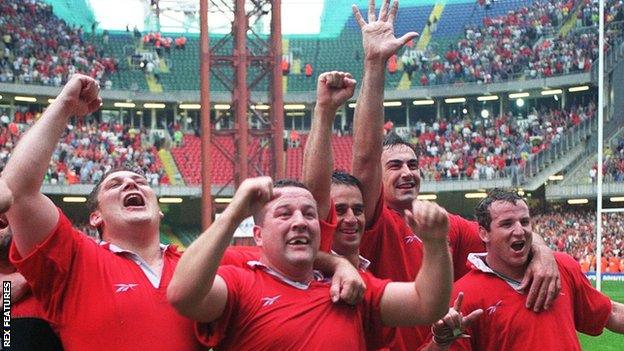Principality Stadium 20 years on: The day Wales finally beat South Africa
- Published

Garin Jenkins and Graham Henry
Before June 26, 1999, previous matches against South Africa usually came with a health and safety warning for Wales.
But 20 years ago, as Wales celebrated a famous first victory over the Springboks, the plastic safety helmets came off in a newly opened but still half-built Millennium Stadium, flying into the air in celebration at the final whistle.
The now historic date captured two memorable moments - an elusive first victory over South Africa in the opening game at the new home of Welsh rugby.
When you see the 74,500-capacity Principality Stadium, as it is now called, it is hard to imagine there were only 27,000 fans and construction workers watching as Wales beat the world champions.
The construction employees were working around the clock getting the stadium ready in time for the 1999 Rugby World Cup, with the iconic sliding roof one of many jobs still to be completed in a project driven by former Welsh Rugby Union chairman Glanmor Griffiths.
On a scorching summer's day in Cardiff it proved an historic homecoming for then Wales coach Graham Henry's side, after more than two years in exile during the reconstruction phase where they played home matches at Wembley.
It was 13th time lucky for Wales against the Springboks after 12 defeats, and the win was all the more remarkable as it came almost a year to the day after a humiliating 96-13 defeat at Loftus Versfeld in Pretoria.
Training in hard hats
It would have been a strange picture for the mighty South African side that included titans such as Gary Teichmann and Percy Montgomery and was coached by Nick Mallett.
Wales hooker Garin Jenkins remembers the unfinished stadium before the game, where the players were given hard hats to wear.

Gareth Thomas celebrates scoring against South Africa
"I don't think they laid the pitch until a couple of days before the game, so the final training session before was a bit makeshift," said Jenkins.
"There was some overhanging girder work and we had to wear the red helmets because there was a lot of work going on.
"It was quite a sight and we had to wear them to the pitchside because the stadium was not finished."
The incomplete work did not stop the spirits of the 27,000 who turned up on the day.
"It was just a great occasion and it sounded like there were 300,000 there," said Henry.
"The ground was unfinished and there were some concrete mixers around.
"It was a special place and it was just great to christen it that day with a win. It just all came together that day."
Jenkins recalled the pre-match buzz.
"The atmosphere was fantastic, with people coming to the stadium for the first time and watching us play against the world champions," said Jenkins.
"I remember Sir Tasker Watkins (former Welsh Rugby Union president) and Francois Pienaar (South Africa World Cup-winning captain) parading the World Cup around the ground before the game."
After scoring the final try at the old National Stadium against England in March 1997, scrum-half Rob Howley celebrated another milestone by leading Wales out at the new venue for the first time.
"It was a proud moment for Wales and for me, in particular as captain," said Howley.
"The memories of that day are special. Yes, the stadium wasn't finished but the excitement about the project and what was to come was huge."
Great Redeemer
Wales arrived confident as they began to benefit from the legacy of new coach Henry, who had been dubbed the 'Great Redeemer'.
The New Zealander was appointed as Wales coach in 1998 and had turned around the team's flagging fortunes.
After beating France in Paris for the first time since 1975 and defeating England at Wembley, the successful Five Nations finale was followed by a 2-0 series win in Argentina.
"We had got on a bit of a roll and were on a high at the time," said Henry.
Former Swansea hooker Jenkins agreed: "It was a good time for Wales.
"We had just come back from Argentina fresh from two hard-fought victories. It was the last game before the end of the season before the World Cup came to Cardiff, so it was a relaxed build-up."
Sweet Success

Mark Taylor breaks clear on his way to the first try scored at what is now called the Principality Stadium
Fly-half Neil Jenkins scored the first points and centre Mark Taylor ensured he would became a pub quiz answer by scoring the first try at the new stadium.
The stadium announcer infamously awarded the try to his midfield partner Allan Bateman, after the pair had swapped number 12 and 13 shirts in the tunnel.
"There was huge excitement and relief when he crossed for that famous moment," recalled Howley.
"That try is still referenced and talked about now, that's how special it was."
Wing Gareth Thomas scored a second-half try, with fly-half Jenkins kicking 19 points to set up a famous victory.
The win was all the sweeter because of that 96-13 drubbing in their encounter in South Africa the previous year.
An under-strength Wales side were labelled as the worst of all time by some pundits in South Africa, with Jenkins a second-half replacement as the Springboks almost reached 100 points.
"There were a lot of players who had been involved in the ill-fated 1998 tour to South Africa so it was a great opportunity and there was a lot of motivation," said Jenkins.
"There was an incentive and belief in the camp and we wanted to get a scalp against a southern hemisphere side."

Peter Rogers, Garin Jenkins, Shane Howarth, Chris Wyatt and Brett Sinkinson celebrate Wales' first win against South Africa
For Henry there was another reason why defeating South Africa was extra special.
"From where I come from, the Springboks were our number one contestants," said Henry.
"In New Zealand I had grown up with that Springboks and All Blacks rivalry in my blood.
"So to beat a South Africa side who were world champions and open the Millennium Stadium with a win was a special occasion.
"To beat them for the first time in Wales' history made it even more magical."
Jenkins recalled the victory was predictably well celebrated.
"It was such a beautiful June day and it took about two hours to walk across the road to the post-match function through the crowds," said Jenkins.
"It capped a fantastic day."
'Best stadium in the world'

Scott Quinnell on the charge against South Africa in 1999
The victory was part of a 10-match winning sequence for Wales under Henry, before their World Cup quarter-final elimination later that year.
Henry also suffered World Cup last-eight heartbreak in 2007 when his New Zealand side were beaten by France in Cardiff, before the All Blacks finally won the World Cup again on home soil four years later.
"I don't blame the Millennium Stadium for that defeat against France!" said Henry.
"There are two special stadiums for me. Eden Park in Auckland, where I grew up, and the Millennium Stadium, where I was fortunate enough to have an association with Wales.
"It's the best stadium in the world. It's a special place and something the Welsh nation should be proud to have a venue like that right in the centre of Cardiff."
Howley agreed with Henry's sentiments.
"To look at its reputation and world standing now I'm proud of the stadium as a Welshman," added Howley.
"It's special we were the first side to play on it."
1999 teams:
Wales: Howarth; G Thomas, Bateman, M Taylor, D James; N Jenkins, Howley; Rogers, G Jenkins, Young, C Quinnell, Wyatt, Charvis, Sinkinson, S Quinnell.
Replacements: Davies, Jones, Llewellyn, Voyle, Evans, Lewis, Humphreys.
Tries: Taylor, G Thomas; Cons: N Jenkins (2); Pens: Jenkins (5).
South Africa: Montgomery; Terblanche, Muller, Mulder, Rossouw; Van Straaten, Swanepoel; Kempson, Drotske, Visagie, Boome, Otto, Krige, Erasmus, Teichmann.
Replacements: Paulse, Du Toit, Von Hoesslin, Vos, Venter, Le Roux, Marais.
Tries: Montgomery, Swanepoel; Pens: du Toit, van Straaten (2).
Referee: E Morrison (England).